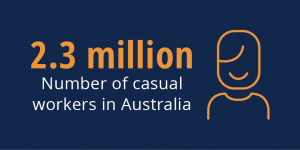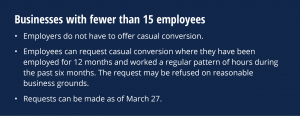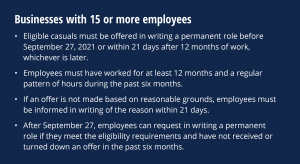Casual staff make up an important part of many businesses, with an estimated 2.3 million casual workers in Australia.
But significant changes to the Fair Work Act have reshaped the rules around casual staff, which means you need to review how you employ casuals.
The changes, which took effect on March 27, 2021, include a new definition for a casual worker whereby:

- A person is offered a job;
- The offer is based on there being no firm advance commitment that the work will continue indefinitely with an agreed pattern of work; and
- They accept the offer knowing that there is no firm advance commitment and become an employee.
CCIWA Principal Workplace Relations Advocate Paul Moss said this change will provide greater clarity as to which employees are casuals and reduces risk of future claims by employees where working patterns change over time.
As well as a new definition of a casual worker, the Fair Work Act changes ensure a court must account for casual loading in claims for unpaid entitlements.
This means that where a worker is found to not be a true casual, any back pay they receive must be reduced by an amount equivalent to their casual loading.
The Act defines the relevant entitlements being compensated for by casual loading as:
- Paid annual leave;
- Paid personal/carer’s leave;
- Paid compassionate leave;
- Payment for absence on a public holiday;
- Payment in lieu of notice on termination; and
- Redundancy pay.
However, how this is done differs depending on the size of your business.


As part of the changes, small businesses must provide new and existing staff with a copy of the Fair Work Ombudsman Information Sheet, while bigger businesses have until September 27.
- The employee’s position will cease in the next 12 months;
- The hours of work will be significantly reduced in that period; or
- There will be a significant change in the days or times the employee will be required to work which can’t be accommodated within their availability.
However, under the new laws you can’t alter an employee’s hours of work or terminate their employment in an attempt to avoid the casual conversion obligation.
- Whether an employer can elect to offer work and if the person can elect to accept or reject work;
- Whether the person will work as required, according to the needs of the employer;
- Whether the employment is described as casual; and
- Whether a casual loading or specified casual rate applies.
This will provide you with greater certainty when taking on casual workers, because the scope the courts use to determine the nature of the employment relationship is more defined.
We've further broken down the changes and how it affects your casual workers here:
Dealing with disagreements
Disagreements with workers about casual conversion can be resolved through:
- The dispute settlement procedure provided for under a relevant award, agreement or employment contract; or
- Conciliation before the Fair Work Commission where the above does not apply.
CCIWA is here to help members navigate the new IR provisions around casuals.
Contact CCIWA’s Employee Relations Advice Centre for free help navigating the changes on (08) 9365 7660, or email [email protected].






